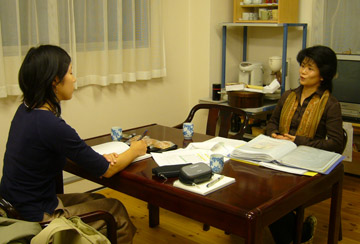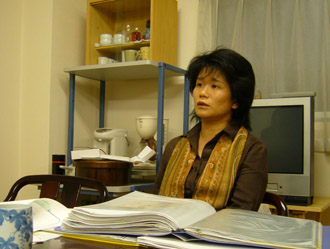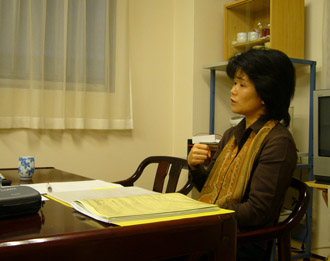Izumi NIKI
Graduate student, ICU
【The article below is the same as the article that appears in the ninth issue of the CGS Newsletter.】
 Support House Jomu is an NPO that provides a safe space for women who have experienced sexual discrimination or violence. It offers various courses and workshops, a counseling service, and a social lounge for relaxation. I interviewed Ms. Naoko Takayama, a counselor at Jomu who has counseled many women struggling with problems such as work-related issues, sexual harassment and more.
Support House Jomu is an NPO that provides a safe space for women who have experienced sexual discrimination or violence. It offers various courses and workshops, a counseling service, and a social lounge for relaxation. I interviewed Ms. Naoko Takayama, a counselor at Jomu who has counseled many women struggling with problems such as work-related issues, sexual harassment and more.
In Japan, the term “counseling” is often confused with psychotherapy and psychiatry, which aims at psychological or mental treatment, but in the U.S. where counseling is a well-established academic discipline, it is widely understood that counselors are specialists who support their clients in problem resolution through dialogue. Takayama, who earned her master's degrees in women’s studies and counseling in the U.S., believes that the whole point of counseling is to trust in the clients’ own ability to resolve their problems and to help draw this ability out.
“The amount of time that I spend with each client,” says Takayama, “is only about one and a half hours per week. The rest of the week they are alone, surviving with a strength that is innate and not something that I give them. Often people are not aware that they possess an innate strength; counseling is a process which restores their long-lost abilities and confidence through dialogue.” Takayama is always conscious that she must never judge her clients. “Counselors are not judges,” she says. She tries to set aside her own values when listening to clients in an effort to understand their point of view better. “In order to truly empathize with them, my own values are nothing but an obstacle.”
 There is a reason why Takayama finds it so important to understand her clients well; ten years ago, she herself was a victim of stalking for 14 months when she first studied abroad in the U.S. Following the psychological torment, “I suffered from diarrhea and allergies and my body was a wreck.” Ironically, her suffering continued even after the stalker’s arrest, with the support she received from many well-intentioned people. “I pushed myself too hard. I continued to study while dealing with the trial until, eventually, I became sick of everything. While I could see that everyone was trying hard to help me, it was their support that became the most difficult experience. I couldn’t stop. I couldn’t whimper. Maybe I could have, but it seemed impossible at the time.”
There is a reason why Takayama finds it so important to understand her clients well; ten years ago, she herself was a victim of stalking for 14 months when she first studied abroad in the U.S. Following the psychological torment, “I suffered from diarrhea and allergies and my body was a wreck.” Ironically, her suffering continued even after the stalker’s arrest, with the support she received from many well-intentioned people. “I pushed myself too hard. I continued to study while dealing with the trial until, eventually, I became sick of everything. While I could see that everyone was trying hard to help me, it was their support that became the most difficult experience. I couldn’t stop. I couldn’t whimper. Maybe I could have, but it seemed impossible at the time.”
She went to a counselor and that was her very first encounter with counseling, as a client rather than a counselor. She found it difficult to explain her true feelings at that time and quit going to sessions midway, but that experience prompted her desire to become a counselor that really understood her clients. She finished her master’s degree in women’s studies, returned to Japan and worked for a few years, and again went back to the U.S. to become a counselor.
There is one thing that Takayama learned from her own experience and not from her studies, which helps her understand her clients better: it is not easy to heal suffering. “Although my stalker received punishment,” she says, “my suffering of 14 months haunted me. I wished that the stalker could go through the same torture that I did.”
But that would never solve anything, she realized. She says, “From my experience, I believe that my revenge is to become happier, to continue to become happier so that today is better than yesterday, tomorrow will be better than today, next week better than tomorrow, and I’ll be happier next month, next year, 10 years later and always. I’ll be grateful to live, I’ll enjoy my life, and I’ll appreciate life.” Furthermore, “This is also part of my revenge, to talk about my experience, like I am doing now, and practicing what I think is the best approach in counseling to see as many clients as possible leave this room a little bit happier than when they came in through that door over there.”
She has a message for people experiencing hardships in this contradictory society; “To be true to yourself and to survive are two different things.” She says, “Sometimes you have to make choices that you would never have made if you had a better option. Some people feel split apart because their means of survival contradict their ideal lifestyle. Some of them try to resist and struggle, while others may remain silent. But, in the end, they are all survivors.”
Takayama, however, also understands the pain of remorse and self-hatred that comes from regretting your past decisions. She says, “Wondering why we chose this option rather than that option or being asked by other people why we didn’t do this or that... we eventually start to ask ourselves why we ended up like this.”
 But Takayama always tells her clients, “You made the best decisions you could at the time,” and “no one but you can live your life in the same way as you do. You are the only expert of your life. No matter how smart or experienced other people may be, they can never take your place. Trust yourself. Trust your decisions.”
But Takayama always tells her clients, “You made the best decisions you could at the time,” and “no one but you can live your life in the same way as you do. You are the only expert of your life. No matter how smart or experienced other people may be, they can never take your place. Trust yourself. Trust your decisions.”
Takayama hopes that people will start finding it easier to go to counselors and use counseling as a tool to reactivate their latent ability to make their own judgments. “Counselors,” she says, “do not know anything about you ahead of time. We notice things that families and friends do not, and we won’t stop helping you no matter how long it takes. Your information will be strictly confidential. Talk to us. About things that you can’t tell your family and friends. About your love life or whatever. Talk it through and sort out your thoughts and feelings so you can come up with your own answers.”
The counseling service at Jomu is 3,500 yen per 45-minute session for nonmembers and 2,000 yen for members of Jomu or Women's Union Tokyo. Reservations required.
Naoko Takayama, M.A.
Counselor and staff member, Support House Jomu.
2006-present Support House Jomu
2006 M.A (counseling),
Wayne State University, USA
2000-2003 Worked at an IT company
1996-2000 Worked at a women’s organization
1996 M.A. (women’s studies),
Eastern Michigan University, USA
Support House Jomu Website:
http://www15.ocn.ne.jp/?jomu/